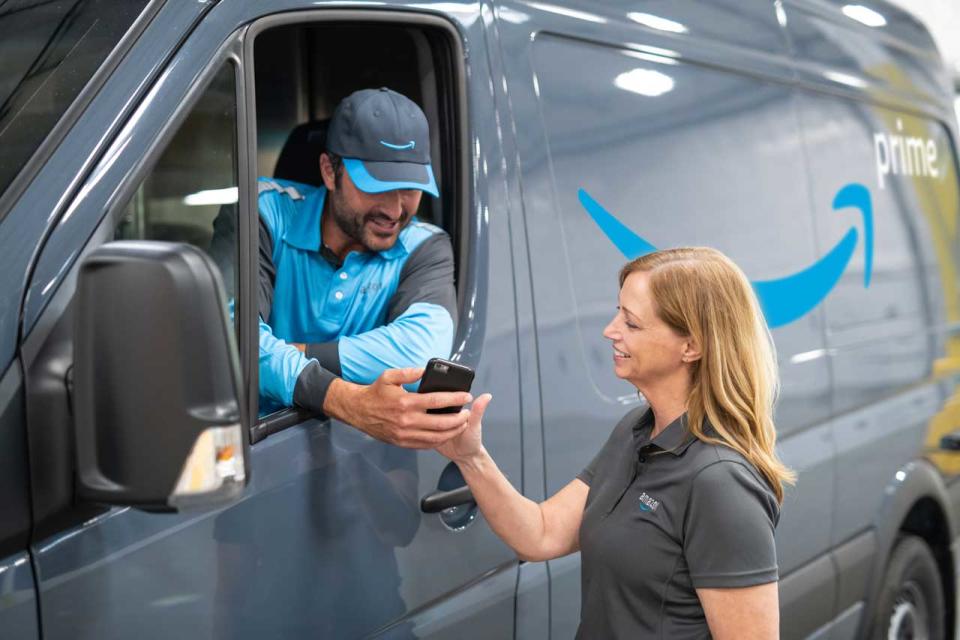Amazon Is Paying Employees $10,000 to Quit and Start Delivery Businesses
Amazon.com (NASDAQ: AMZN) dropped a bombshell during the conference call to discuss its first-quarter results last month. According to CFO Brian Olsavsky, the company would be making significant changes to its popular free shipping program. "We're currently working on evolving our Prime free two-day shipping program to be a free one-day shipping program," he said. "We're able to do this because we've spent 20-plus years expanding our fulfillment and logistics network, but this is still a big investment and [we have] a lot of work ... ahead of us."
Now, Amazon has announced the next step toward that objective. The company just revealed it will expand its Delivery Service Partner program in the U.S., paying eligible employees $10,000 to start their own delivery businesses.

Image source: Amazon.
An offer they can't refuse?
In a blog post on Monday, the e-commerce leader said the new incentive program would encourage current Amazon employees to start a small business -- that is, to own and operate a package delivery company. To help its workers take the plunge, Amazon said it would commit to funding start-up costs (up to $10,000) and the equivalent of three months' gross salary to help "get their package delivery companies off the ground."
This program also listed a host of benefits -- for example, consistent delivery volume from Amazon, as well as "access to the company's sophisticated delivery technology, hands-on training, and discounts on a suite of assets and services, including Amazon-branded vans customized for delivery, branded uniforms, and comprehensive insurance."
The offer is the latest expansion of a program Amazon introduced last year.
A big move into shipping
In mid-2018, Amazon introduced the Delivery Service Partners program, which was designed to give the company more control over the "last mile" of product shipments to consumers. At the time, Amazon said it would help entrepreneurs start, set up, and manage their own local delivery business. Each business owner approved for the program would oversee between 20 and 40 Amazon-branded delivery vans.
Amazon said that successful candidates earn between $75,000 and $300,000 in annual profits. As with its current iteration, Amazon said it would provide the training and access to its technology, as well as discounts on its leases, insurance, and uniforms.
The company has long said that it relied too heavily on its third-party courier network, which includes companies like FedEx, United Parcel Service, and the U.S. Postal Service to handle package shipments to consumers. By augmenting the capabilities of its existing network, Amazon could potentially reduce its shipping costs while ensuring additional capacity during times of peak volume -- like the holidays.
Since the inception of the program last year, more than 200 new small businesses had hired thousands of local drivers to deliver Amazon packages to customers. The company is planning to expand this offer to employees in the U.K. and Spain as well.
An ulterior motive?
This is just the latest development involving Amazon's shipping ambitions. Late last month, it quietly debuted its freight brokerage platform, freight.amazon.com, in Connecticut, Maryland, New Jersey, New York, and Pennsylvania.
The incentive costs Amazon is paying for the program expansion are a drop in the bucket compared to its massive revenue, which topped $232 billion last year. And Amazon currently has about 650,000 full- and part-time employees around the world, so the potential of 500 or so employees taking them up on the offer is unlikely to affect other departments.
By inspiring employees to expand its logistics network, Amazon can ensure it has the capacity it needs to meet its ambitious one-day shipping goals.
More From The Motley Fool
John Mackey, CEO of Whole Foods Market, an Amazon subsidiary, is a member of The Motley Fool's board of directors. Danny Vena owns shares of Amazon. The Motley Fool owns shares of and recommends Amazon and FedEx. The Motley Fool has a disclosure policy.

